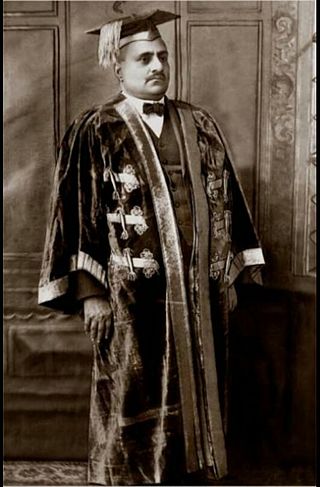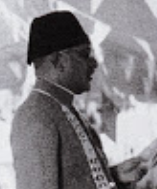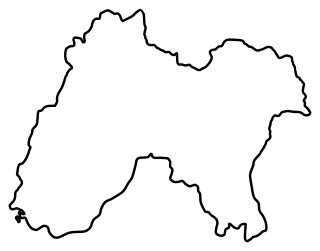Related Research Articles

The Parliament of Pakistan is the supreme legislative body of the Islamic Republic of Pakistan. It is a bicameral federal legislature, composed of the President of Pakistan and two houses: the Senate and the National Assembly. The president, as head of the legislature, has the power to summon or prorogue either house of the Parliament. The president can dissolve the National Assembly, only on the Prime Minister's advice.

The Constituent Assembly of India was partly elected and partly nominated body to frame the Constitution of India. It was elected by the Provincial assemblies of British India following the Provincial Assembly elections held in 1946 and nominated by princely states. After India's independence from the British in August 1947, its members served as the nation's 'Provisional Parliament', as well as the Constituent Assembly. It was conceived and created by V. K. Krishna Menon, who first outlined its necessity in 1933 and enshrined it as an Indian National Congress demand.

The Lahore Resolution, also called the Pakistan Resolution, was a formal political statement adopted by the All-India Muslim League on the occasion of its three-day general session in Lahore, Punjab, from 22 to 24 March 1940, calling for a separate homeland for the Muslims of British India.

The Dominion of India, officially the Union of India, was an independent dominion in the British Commonwealth of Nations existing between 15 August 1947 and 26 January 1950. Until its independence, India had been ruled as an informal empire by the United Kingdom. The empire, also called the British Raj and sometimes the British Indian Empire, consisted of regions, collectively called British India, that were directly administered by the British government, and regions, called the princely states, that were ruled by Indian rulers under a system of paramountcy, in favor of the British. The Dominion of India was formalised by the passage of the Indian Independence Act 1947, which also formalised an independent Dominion of Pakistan—comprising the regions of British India that are today Pakistan and Bangladesh. The Dominion of India remained "India" in common parlance but was geographically reduced by the lands that went to Pakistan, as a separate dominion. Under the Act, the King remained the monarch of India but the British government relinquished all responsibility for administering its former territories. The government also revoked its treaty rights with the rulers of the princely states and advised them to join in a political union with India or Pakistan. Accordingly, one of the British monarch's regnal titles, "Emperor of India," was abandoned.

From 14 August 1947 to 23 March 1956, Pakistan was an independent federal dominion in the British Commonwealth of Nations. It was founded by the passing of the Indian Independence Act 1947 by the British parliament.

The history of East Bengal and East Pakistan from 1947 to 1971 covers the period of Bangladesh's history between its independence as a part of Pakistan from British colonial rule in 1947 to its independence from Pakistan in 1971.

General elections were held in British India in 1920 to elect members to the Imperial Legislative Council and the Provincial Councils. They were the first elections in the country's modern history.

General elections were held in British India in December 1945 to elect members of the Central Legislative Assembly and the Council of State. The Indian National Congress emerged as the largest party, winning 57 of the 102 elected seats. The Muslim League won all Muslim constituencies, but failed to win any other seats. Of the 13 remaining seats, 8 went to Europeans, 3 to independents, and 2 to Akali candidates in the Sikh constituencies of Punjab. This election coupled with the provincial one in 1946 proved to be a strategic victory for Jinnah and the partitionists. Even though Congress won, the League had united the Muslim vote and as such it gained the negotiating power to seek a separate Muslim homeland as it became clear that a united India would prove highly unstable. The elected members later formed the Constituent Assembly of India.

Provincial elections were held in British India in January 1946 to elect members of the legislative councils of the Indian provinces. The Congress, in a repeat of the 1937 elections, won (90%) of the general non-Muslim seats while the Muslim League won the majority of Muslim seats (87%) in the provinces.

Nawab Iftikhar Hussain Khan of Mamdot was a Pakistani politician and an advocate of the Pakistan Movement in British India. After Pakistan's Independence, he served as the 1st Chief Minister of West Punjab and later as the Governor of Sindh.
Omar Hayat Malik was a Pakistani politician, educationist and diplomat.

Elections to the Punjab Provincial Assembly were held in January 1946 as part of the 1946 Indian provincial elections.
Harendra Kumar Sur was an anti-colonial Bengali politician, and a representative of East Pakistan to the Constituent Assembly of Pakistan.
Bhabesh Chandra Nandi was a representative of East Pakistan in the Constituent Assembly of Pakistan.
Jnanendra Chandra Majumdar was an anti-colonial Bengali politician, and a representative of East Pakistan to the Constituent Assembly of Pakistan.

Akshay Kumar Das was a Bengali Hindu politician of Pakistan, who served as a representative of East Pakistan in both the First and Second Constituent Assemblies, and held multiple ministries across the 1950s in governments formed by different political parties.
Seth Sukhdev Udhavdas was a Sindhi landlord and anti-colonial politician associated with the Indian National Congress. After partition, he chose to stay in Pakistan and allied with the Pakistan National Congress. In July 1949, Sukhdev was inducted as the non-Muslim representative of Sindh in the Constituent Assembly of Pakistan since Jairamdas Daulatram —the erstwhile representative in the Constituent Assembly of India on a Congress ticket— chose to stay in India.
Sardar Asad Ullah Jan Khan was a Pakistani Pakhtun politician from Kulachi, who represented North-West Frontier Province in the Constituent Assembly of Pakistan. Chieftain of the Gandapur tribal segment, Khan commanded influence in the society; besides, he was a local land magnate.
Rai Bahadur Ganga Saran was an Indian trade unionist and politician from Punjab. He was a member of the Punjab Provincial Assembly and both the Constituent Assembly of India and the Constituent Assembly of Pakistan.
Provincial Assembly elections were held in Dominion of Pakistan in 1951 to elect all 192 members of the Provincial Assembly of West Punjab along with other provincial election in North-West Frontier Province. It was Pakistan's first provincial assembly election. Pakistan Muslim League won the election, and defeated the JAML coalition of the Jinnah Muslim League and All-Pakistan Awami Muslim League.
References
- 1 2 Government of Punjab. "First Legislative Assembly of Punjab (August 15, 1947 to January 25, 1949)".
- 1 2 "Vol. I of Press Information Bureau's Morgue and Ref Series: (1) Analysis of the Results of General Elections to the Central and Provincial Legislatures Held In 1945-46 (2) Indian Political Parties, and (3) Provincial Minstries 1937-45". Home Political, ID: HOME_POLITICAL_I_1945_NA_F-79-46. National Archive of India.
- ↑ Jalal, Ayesha (2000). "At the crossroads of 'Pakistan'". Self and Sovereignty: Individual and Community in South Asian Islam Since 1850. Routledge. p. 471. ISBN 0415220777.
- ↑ Rao, B. Shiva (1968). The Framing of India's Constitution: A Study. Nasik, India: The Indian Institute of Public Administration. pp. 93–95.
- ↑ Rao, B. Shiva (1968). The Framing of India's Constitution: Select Documents. Vol. I. Nasik, India: The Indian Institute of Public Administration. p. 308.
- ↑ "Pakistan". The Commonwealth Relations Office List 1952. London: Her Majesty's Stationery Office. 1952. p. 171.
- ↑ Carter, Lionel, ed. (2018). "Pakistan: Monthly Appreciation of General Situation for October 1948". TNA: FO 479/2 -- Towards a Ceasefire in Kashmir: British Official Reports from South Asia, 18 September – 31 December 1948. London: Routledge. ISBN 9780429491658.
- ↑ "Condolence on the demises of Sheikh Karamat Ali and Mr. Serajul Islam" in The Pakistan Constituent Assembly Debates (1951)